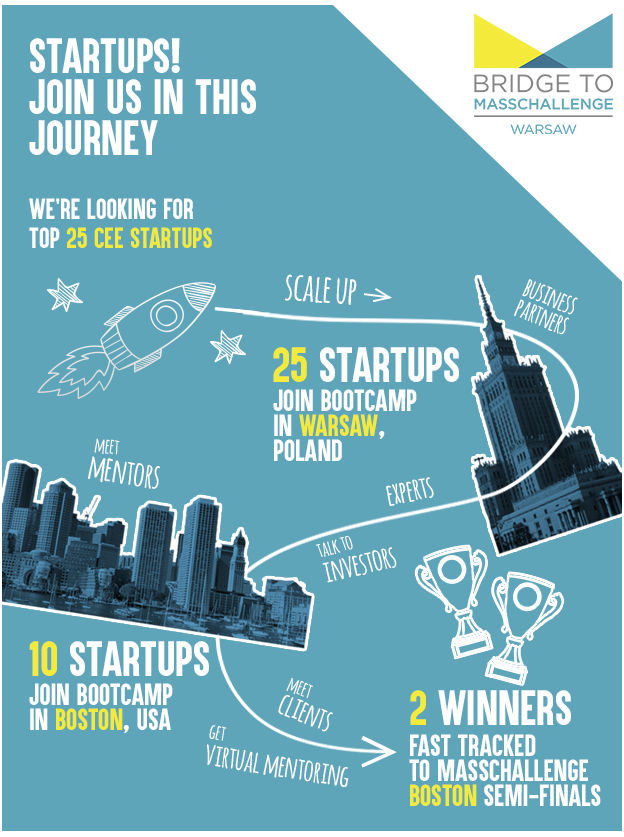MassChallenge, one of the world’s biggest accelerators, enters Central and Eastern Europe. The goal is to find CEE startups offering products that could raise interest of global corporations.
The name “MassChallenge” may not ring a bell in Central and Eastern Europe, but in countries where the startup ecosystem is more mature, such as USA or Israel, the program has a close-to-legendary status. Why is that? Many accelerators attract startups with the possibility of an in-cash investment. MassChallenge involves money, but it is not a priority. MassChallenge attracts startups with the opportunity to cooperate with program’s partners, namely the world’s biggest companies.
The MassChallenge concept is based on a very close cooperation between a startup and a corporation. Within the accelerator, highly ranked managers who handle budgets amounting to millions of dollars and teams of thousands of people become mentors for startup founders. But that’s not all. Corporations report their innovation demand to the accelerator participants, make their infrastructure and data available for the startups or work jointly on implementation of ideas. Partners may also prepare special projects for startups of particular sectors. Boeing for example, provides the best aviation sector companies with an opportunity to test their products on the International Space Station. On the other hand, startups inform the accelerator what experts they need at certain stage of their development. The experts are chosen from a worldwide network of more than 1000 mentors. The cooperation between a startup and a corporation is a win-win relationship. A big company obtains the technology it needs, and a startup develops its product and gains knowledge and contacts necessary to enter new markets.
So far MassChallenge looked for startups in U.S., Western Europe, Israel or Mexico. Finally it enters CEE – Central and Eastern Europe is an area of a large and still growing potential – more than 30 thousand startups and over 20-fold increase of investment in early-stage projects over the last 5 years – these numbers speak for themselves. No wonder that both the global accelerators and the big corporate players are getting more and more interested in this part of the world – says Paweł Bochniarz, president of the Foundation for Technology Entrepreneurship, the entity introducing the program to the region.
Bridge to MassChallenge Warsaw (B2MC) – as the pilot edition of the program for Central and Eastern Europe is named – looks for companies that already have their product validated, have verified the demand for it and are now ready to introduce it to other countries. Top 25 companies will be chosen from among the submitted applications. This group will receive business scaling support from international mentors during an intensive 4-day boot camp in Warsaw. Top ten enterprises will travel to Boston where they will have a chance to verify their development plans within the international MassChallenge ecosystem.
Partners of B2MC include PKO Bank Polski – Central Europe’s biggest bank, Visa – world leader in digital payments and PGE – the biggest energy company in Poland. Recently all of these institutions have been strongly focused on innovations. Visa is involved in promoting innovation in Poland, among others by supporting acceleration programs for startups – it partners also with MIT Enterprise Forum Poland. – “As a company for which innovations are the foundation, we try to be wherever a chance for a breakthrough appears” – says Jakub Kiwior, Visa director for business and marketing development in Central and Eastern Europe. PKO Bank Polski recently purchased ZenCard – a startup allowing virtualization of loyalty cards.
We hope that in Bridge to MassChallenge we will find technologies that we will be able to implement in our business or invest in. Fintech sector is an obvious direction for us. However, we are also open to other great ideas from the sectors of the economy that use such technologies as blockchain, AI or VR – says Grzegorz Pawlicki from PKO Bank Polski. He adds that apart from the mentor support, the bank also offers an opportunity to test solutions developed by the accelerator participants and hopes to cooperate closely with startups.
The energy-focused partner of the program – PGE, seeks, on the other hand, young companies that will enable innovations in fields such as electromobility, infrastructure security or sales and customer service. The company strongly focuses on new technologies and business models – thus the most innovative startups will gain a chance to win a new customer, business partner or a serious investment. – “We monitor global trends and strive to adapt to them in advance. Bridge to MassChallenge allows us to move beyond national borders and explore business opportunities across entire CEE region” – says Henryk Baranowski, President of the PGE Management Board
Applications for Bridge to MassChallenge can be submitted by November 6. Is it worth it? MIT once did a research among the companies that went through MassChallenge. It turned out that participation in the accelerator doubles the chance of a startup getting financial backing from investors and increasing employment to 15 people.
Learn more about the program, visit the MassChallenge website, and apply now!





